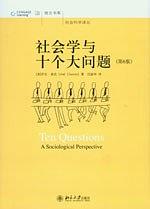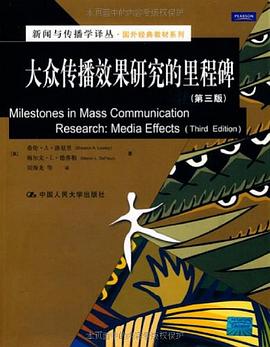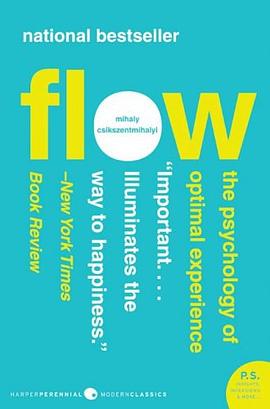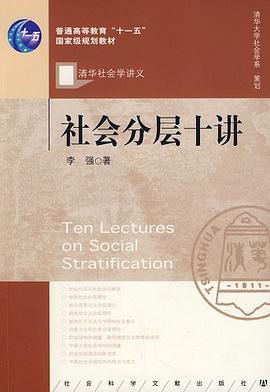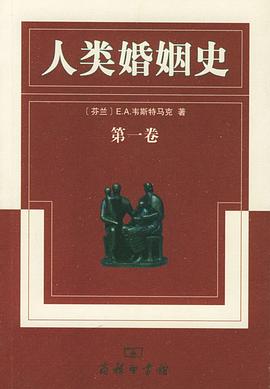

具体描述
Why is the Mona Lisa the most famous painting in the world? Why did Facebook succeed when other social networking sites failed? Did the surge in Iraq really lead to less violence? How much can CEO’s impact the performance of their companies? And does higher pay incentivize people to work hard?
If you think the answers to these questions are a matter of common sense, think again. As sociologist and network science pioneer Duncan Watts explains in this provocative book, the explanations that we give for the outcomes that we observe in life—explanation that seem obvious once we know the answer—are less useful than they seem.
Drawing on the latest scientific research, along with a wealth of historical and contemporary examples, Watts shows how common sense reasoning and history conspire to mislead us into believing that we understand more about the world of human behavior than we do; and in turn, why attempts to predict, manage, or manipulate social and economic systems so often go awry.
It seems obvious, for example, that people respond to incentives; yet policy makers and managers alike frequently fail to anticipate how people will respond to the incentives they create. Social trends often seem to have been driven by certain influential people; yet marketers have been unable to identify these “influencers” in advance. And although successful products or companies always seem in retrospect to have succeeded because of their unique qualities, predicting the qualities of the next hit product or hot company is notoriously difficult even for experienced professionals.
Only by understanding how and when common sense fails, Watts argues, can we improve how we plan for the future, as well as understand the present—an argument that has important implications in politics, business, and marketing, as well as in science and everyday life.
作者简介
Duncan J. Watts (born 1971) is an Australian researcher and a principal research scientist at Yahoo! Research, where he directs the Human Social Dynamics group. He is also a past external faculty member of the Santa Fe Institute and a former professor of sociology at Columbia University, where he headed the Collective Dynamics Group. He is author of the book Six Degrees: The Science of a Connected Age and Everything is Obvious Once You Know the Answer.
目录信息
读后感
“在听说发生森林火灾时,我们并不会去想点燃这场大火的火星有什么特别之处。这种想法确实比较可笑。但是,当看到社会中发生特别之事时,我们却会立刻这样想:无论是谁引发了此事,他一定不是普通人。” 01 — 英文版是2012年出的。一些案例和思想在其他读物中见过了。 作者在...
评分生活中,我们有个词汇,叫“马后炮”,专指一些后见之明的、事后诸葛的家伙。 作为平凡老百姓,我们可以坦然面对这种缺陷,并且一笑了之。但如果说,在严谨的社会学研究界,也大量充斥着很多的马后炮,就不能不让人惊讶了,毕竟,这些家伙可是专业人士啊。 恰恰是专业人士...
评分读完一本书不写篇书评好像一句话没句号一样。 不过这是我不太想写的一本书。因为看完没有让我有那种豁然开朗或者被激励的那种激情,也可能与作者背景相关,邓肯 J 瓦茨是做互联网企业研究的,优势在于他掌握很多研究案例以及有机构和能力对案例进行数据收集与分析,这是这本书...
评分 评分用户评价
初读《Everything Is Obvious》,我以为它会是一本聚焦于个人成功学的著作,教我如何发现那些隐藏的商机,如何在竞争激烈的社会中脱颖而出。然而,这本书所涵盖的内容,远比我最初的设想来得更为宏大和深刻。作者并没有直接给出“一蹴而就”的答案,而是通过对“显而易见”这一概念的层层解构,引导读者去探索其背后的复杂性。我特别欣赏作者在分析“显而易见”如何被用来巩固现有权力结构和维护既得利益时所展现出的敏锐洞察力。他通过引用大量的历史事件和政治分析,揭示了“显而易见”往往是一种被精心塑造的观念,它能够有效地规训人们的思想,使其屈从于特定的社会秩序。书中对媒体传播和信息控制的分析,更是让我看到了“显而易见”是如何在潜移默化中影响我们的认知,甚至塑造我们的价值观。作者并没有止步于对“显而易见”的批判,而是积极地探索如何才能真正穿透表象,看到事物的本质。他提出的“反思性审视”、“多角度观察”等方法,为我提供了有力的工具,去辨别那些看似“显而易见”的虚假共识。这本书让我深刻地认识到,真正的智慧并非在于盲目接受“显而易见”的答案,而在于拥有不断质疑和探寻真相的勇气和能力。
评分读完《Everything Is Obvious》这本书,我真的被作者的洞察力深深折服。我原以为这本书会是一本关于如何发现隐藏机遇、如何突破思维定势的指导手册,但它所呈现的内容远比我最初的想象要深刻和广阔。作者并非直接给出“显而易见”的解决方案,而是通过一系列引人入胜的案例分析和理论阐释,引导读者去重新审视那些我们习以为常、理所当然的事物。我最欣赏的是作者在剖析“显而易见”背后的复杂性时所展现出的严谨逻辑和细腻笔触。他并没有简单地将“显而易见”归咎于人类的认知局限,而是深入探讨了社会结构、文化背景、历史进程以及个体经验如何共同塑造了我们对“显而易见”的感知。例如,书中对某些商业决策的分析,让我看到了那些曾经被认为是“天经地义”的策略,在新的时代背景下是如何变得苍白无力,甚至适得其反。作者通过对比不同时期、不同行业中成功的和失败的案例,揭示了“显而易见”往往只是一个暂时的、特定情境下的产物,它容易随着环境的变化而失效。更令人振奋的是,作者并没有停留在批判“显而易见”的层面,而是积极地探索如何才能真正“看见”那些被遮蔽的真相。他提出的“逆向思维”、“情境化分析”等方法,让我对如何培养批判性思维有了更清晰的认识。读这本书的过程,就像是在进行一场深刻的自我对话,不断质疑自己固有的观念,不断挑战自己已有的认知边界。这本书让我明白,真正的智慧并非在于拥有多少“显而易见”的答案,而在于拥有不断探寻和质疑“显而易见”的能力。
评分《Everything Is Obvious》这本书,可以说是一次对“显而易见”的颠覆性解读。我原以为这本书会教我如何“看见”那些被大众忽略的简单道理,如何利用这些“显而易见”的机会来获得成功。然而,作者以一种出人意料的方式,将“显而易见”从一个积极的、易于掌握的概念,转变成了一个需要被深入审视和质疑的社会现象。他通过大量的案例研究和历史分析,巧妙地揭示了“显而易见”是如何在很大程度上是一种人为的建构,是被社会、文化和权力结构所塑造的。我最喜欢的是作者对“显而易见”如何成为思维惰性和创新阻碍的分析。他通过一些历史上的重大发明和科学突破,说明了那些敢于挑战当时“显而易见”的观念的先驱者,是如何最终改变了世界的。这本书让我明白,我们所认为的“显而易见”,很多时候只是因为我们缺乏足够的批判性思维,或者因为我们被固有的思维模式所束缚。作者提出的“反向思考”、“情境化分析”等方法,为我提供了一个全新的视角来审视周围的世界。我开始意识到,真正的“显而易见”并非是简单易懂的道理,而是经过深入分析和理解后所显露出的清晰逻辑。
评分当我拿起《Everything Is Obvious》这本书时,我期待的是一本能教我如何快速抓住机会、获得成功的指导手册。然而,作者以一种出人意料的方式,将“显而易见”从一个积极的、简单的概念,转换成了一个需要被深刻反思和质疑的社会现象。我尤其被书中对“显而易见”如何成为一种思维惰性,如何阻碍创新和进步的分析所吸引。他通过大量的案例研究,从科学史、商业史到社会学,都揭示了那些敢于挑战当时“显而易见”的观念的先驱者,是如何最终推动了历史的进步。作者的论证过程丝丝入扣,逻辑严密,让我不禁对许多曾经深信不疑的“显而易见”产生了怀疑。书中对“显而易见”如何被用来制造群体认同和排斥异己的分析,更是让我深刻地认识到,我们需要警惕那些过于简单和绝对的“显而易见”的说法。作者提出的“打破思维定势”、“寻求多元观点”等方法,为我提供了一个全新的视角来审视周围的世界。我开始意识到,真正的“显而易见”并非是随处可见的简单道理,而是经过深度思考和分析后,才能显露出的清晰逻辑。
评分《Everything Is Obvious》这本书,如同一面棱镜,折射出“显而易见”这一概念背后多重而复杂的面向。在此之前,我对于“显而易见”的理解,更多地停留在一个比较直观和朴素的层面,认为它代表着一种清晰、明了、不容置疑的事实。然而,作者以其非凡的洞察力,带领我走进了一个全新的认知领域。我被书中对“显而易见”如何被构建、被传播、被内化到个人思维模式中的过程的深入剖析所深深吸引。他通过大量的历史事件、社会心理学研究以及文化分析,揭示了“显而易见”并非天然存在,而是社会、文化、权力结构以及个体经验相互作用的结果。书中对于“显而易见”如何成为一种思维陷阱,如何扼杀创新和阻碍进步的论述,尤其让我印象深刻。作者通过对历史上那些敢于挑战当时“显而易见”的先驱者的案例分析,有力地证明了质疑和反思的重要性。我开始意识到,我们所认为的“显而易见”,很大程度上是我们被社会化过程所塑造的认知定势。作者提出的“反思性探究”、“多角度审视”等方法,为我提供了一套非常有价值的工具,让我能够更深刻、更批判性地理解世界。这本书让我明白,真正的智慧并非在于能够迅速识别“显而易见”的答案,而在于拥有不断质疑“显而易见”的勇气和能力。
评分《Everything Is Obvious》这本书,彻底改变了我对“显而易见”的看法。在此之前,我总是认为“显而易见”代表着一种清晰、直接的认知,是一种无需过多思考就能获得的真理。然而,作者以其深刻的洞察力,将“显而易见”描绘成了一个需要被审视、被解构的复杂社会现象。我被书中对“显而易见”如何被用来维护权力结构和巩固既得利益的分析所深深吸引。他通过引用大量的历史事件和政治评论,揭示了“显而易见”往往是权力精英用来规训民众、巩固其统治的工具。书中对信息传播和媒体解读的分析,更是让我看到了“显而易见”是如何在潜移默化中影响我们的认知,甚至是我们对世界的看法。作者的论证过程严谨而富有说服力,让我不禁对许多曾经深信不疑的“显而易见”产生了怀疑。他提出的“反向思考”、“情境化分析”等方法,为我提供了一个全新的视角来审视周围的世界。我开始意识到,真正的“显而易见”并非是简单易懂的道理,而是经过深入分析和理解后,才能显露出的清晰逻辑。
评分在我阅读《Everything Is Obvious》之前,我对于“显而易见”这个词的理解,更多地停留在字面意思上,认为它代表着不言自明、不证自明的道理。然而,这本书彻底颠覆了我对这个概念的认知。作者并非直接给出“显而易见”的答案,而是通过对“显而易见”现象背后成因的深刻剖析,引导读者去思考“显而易见”是如何被构建、被传播、被接受的。我最欣赏的是作者在探讨“显而易见”如何成为认知陷阱时所展现出的深刻洞察。他通过大量的心理学研究和行为经济学案例,说明了人类的认知偏差是如何让我们容易相信那些看似“显而易见”的结论,从而错失了更深层次的真相。书中对信息茧房和群体思维的分析,让我看到了“显而易见”是如何在现代社会中被放大和固化,从而加剧了社会的分裂和偏见。作者并没有停留在批判层面,而是积极地探索如何才能摆脱“显而易见”的束缚,培养更具批判性的思维能力。他提出的“质疑假设”、“寻求多元信息”、“反思自身偏见”等方法,为我提供了切实可行的指导。这本书让我明白,真正的“显而易见”并非是别人强加给你的结论,而是通过独立思考和深度分析后,你自己所“看见”的清晰逻辑。
评分《Everything Is Obvious》这本书给我带来的震撼,远不止于知识的获取,更在于它对我思考方式的重塑。在翻阅这本书之前,我总是习惯性地将“显而易见”的事物视为真理,很少去深究其背后的原因。然而,作者以其独特的视角,将我带入了一个全新的思考维度。书中对“显而易见”的定义和解释,颠覆了我过往的认知。我原以为“显而易见”是某种普遍的、客观存在的真理,但作者却通过大量详实的案例,证明了“显而易见”很大程度上是社会建构的产物,是特定历史时期、特定文化背景下的共识。比如,书中对一些曾经被认为是“天经地义”的社会习俗和价值观念的剖析,让我看到了它们是如何随着时代的变迁而逐渐失去其“显而易见”的光环。作者的论证过程丝丝入扣,逻辑严密,让我不得不对其提出的观点进行深入的反思。我尤其喜欢作者在探讨“显而易见”如何阻碍创新和进步的部分。他通过一些历史上的重大科学发现和技术革新,说明了那些敢于挑战“显而易见”的先驱者,是如何最终推动了人类文明的进步。这本书让我意识到,固守“显而易见”是一种思维上的惰性,它会让我们错失很多宝贵的机遇,甚至阻碍我们实现自身的潜能。作者提出的“打破惯性思维”的训练方法,虽然需要时间和耐心去实践,但却为我指明了一条通往更深层次理解的道路。
评分读完《Everything Is Obvious》,我才真正理解了“显而易见”这个词背后隐藏的复杂性。我原以为这本书会教我如何发现那些被人们忽略的简单道理,如何利用这些“显而易见”的规律来获得成功。然而,作者以一种更加宏大和深刻的视角,将“显而易见”描绘成了一个需要被审视、被质疑的社会现象。我最欣赏的是作者在探讨“显而易见”如何成为一种思维惰性,如何阻碍创新和进步的分析。他通过大量的案例研究,从科学史、商业史到社会学,都揭示了那些敢于挑战当时“显而易见”的观念的先驱者,是如何最终推动了历史的进步。作者的论证过程丝丝入扣,逻辑严密,让我不禁对许多曾经深信不疑的“显而易见”产生了怀疑。书中对“显而易见”如何被用来制造群体认同和排斥异己的分析,更是让我深刻地认识到,我们需要警惕那些过于简单和绝对的“显而易见”的说法。作者提出的“打破思维定势”、“寻求多元观点”等方法,为我提供了一个全新的视角来审视周围的世界。我开始意识到,真正的“显而易见”并非是随处可见的简单道理,而是经过深度思考和分析后,才能显露出的清晰逻辑。
评分《Everything Is Obvious》这本书,对我而言,不仅仅是一本书,更像是一场思维的洗礼。在此之前,我一直认为“显而易见”是智慧的体现,是洞察力的证明。然而,作者以其独特的视角,将“显而易见”描绘成了一个需要被审视、被解构的复杂社会现象。我被书中对“显而易见”如何被用来维护既得利益和阻碍社会进步的分析所深深吸引。他通过引用大量的历史事件和政治评论,揭示了“显而易见”往往是权力精英用来巩固其统治、规训民众的工具。书中对媒体宣传和意识形态控制的剖析,更是让我看到了“显而易见”是如何在潜移默化中塑造我们的认知,甚至是我们对世界的看法。作者的论证严谨而富有说服力,让我不禁对许多曾经深信不疑的“显而易见”产生了怀疑。他提出的“反向思考”、“情境化分析”等方法,为我提供了一个全新的视角来审视周围的世界。我开始意识到,真正的“显而易见”并非是简单易懂的道理,而是经过深入分析和理解后,才能显露出的清晰逻辑。这本书让我学会了不轻易相信那些看似“显而易见”的结论,而是去深入探究其背后的真相。
评分Common Sense篇看完,其中核心点似乎在说明“常识”是人类理解世界的重要框架,但是常识在运用于解释由大量社会成员的活动所造成的现象、事件时,具有很强的误导性,这种误导与人类对于简单因果关系的嗜好,以及对微观与宏观的过渡过程不明有关。
评分"I knew it all along"的后见之明是最大的敌人。。。
评分"I knew it all along"的后见之明是最大的敌人。。。
评分算是对我自己有启发。作者以个人到群体到社会系统的层次分析了常识的错误,以及社会科学难做研究的原因。最直接的结果就是看过这本书的人对于几乎所有分析“XXX为什么成功”的文章都会持保留意见。
评分Correlation isn't causation. History run only once. Prediction is never predictable. Experts fail most of the time. Common sense in non-common.
相关图书
本站所有内容均为互联网搜索引擎提供的公开搜索信息,本站不存储任何数据与内容,任何内容与数据均与本站无关,如有需要请联系相关搜索引擎包括但不限于百度,google,bing,sogou 等
© 2026 onlinetoolsland.com All Rights Reserved. 本本书屋 版权所有

